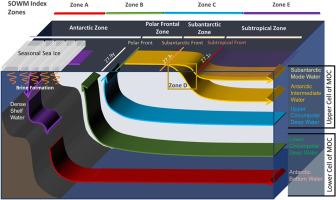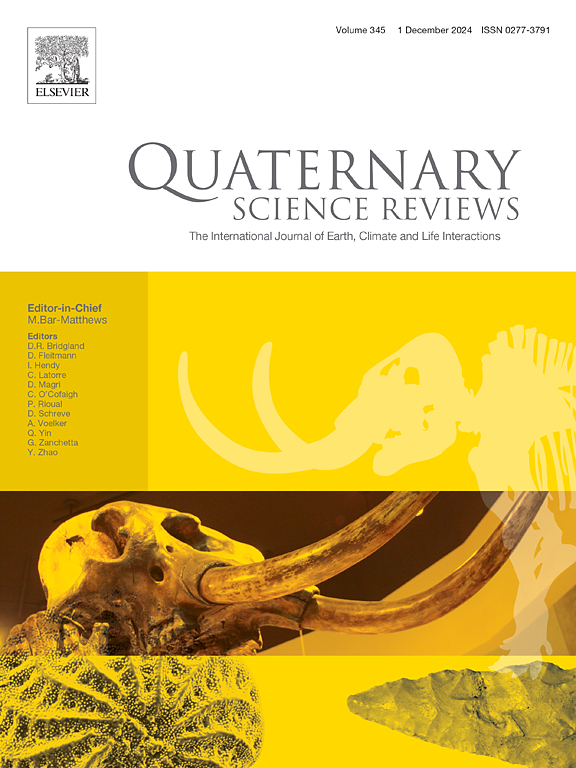南大洋水质量法:利用微化石放射虫洞察南大洋西南太平洋区古海洋学的新统计方法
IF 3.2
1区 地球科学
Q1 GEOGRAPHY, PHYSICAL
引用次数: 0
摘要
南大洋的海洋环流以及水团的形成和上涌在冰川-间冰期周期中与大气进行热量和碳交换方面发挥着至关重要的作用,但人们对次表层水团的历史却知之甚少。放射虫栖息于从海面到海底的水柱中,已知其分布与水团有关。我们利用 SO-RAD 核心顶数据集的放射虫丰度普查数据,探讨了放射虫分布与南大洋西南太平洋区表层和次表层水团结构之间的关系。首先使用非度量多维尺度(Non-Metric Multidimensional Scaling)对物种分布进行了探索。然后使用多元回归树(MRT)分析法了解放射虫分布与水团边界参数(使用等深线深度)和上升流参数(使用营养物质数据)之间的关系。我们确定了一系列与海洋学区域相关的指示物种,并将其用于制定南大洋水体质量指数。指标物种群的贡献提供了有关水柱结构和各种水团相对影响的进一步信息。然后,将该指数应用于先前公布的新西兰以东亚南极区 Y8 和 Y9 两个岩心的放射虫组合数据。南大洋水质量法的结果表明,这两个岩心地点的水质量结构在上一个冰川-间冰期周期中发生了变化。结果与该地区的其他代用数据一致。南大洋水质量法为了解南大洋水质量结构和环流的变化历史提供了新的工具。本文章由计算机程序翻译,如有差异,请以英文原文为准。

Southern Ocean Water Mass method: A new statistical approach using microfossil radiolaria for paleoceanographic insights for the Southwest Pacific sector of the Southern Ocean
Ocean circulation and the formation and upwelling of water masses in the Southern Ocean play a critical role in the exchange of heat and carbon with the atmosphere over glacial-interglacial cycles, but the history of the subsurface water masses is poorly understood. Radiolarians inhabit the water column from the surface to the bottom of the ocean, and their distribution is known to be associated with water masses. We use radiolarian abundance census data from the SO-RAD core top dataset to explore the relationship between radiolarian distribution and surface and subsurface water mass structure of the Southwest Pacific Sector of the Southern Ocean. The species distribution was first explored using non-Metric Multidimensional Scaling. Then Multivariate Regression Tree (MRT) analysis was used to understand the relationship between radiolarian distributions and parameters of water mass boundaries (using isopycnal depths) and upwelling (using nutrient data). We identified a series of indicator species associated with oceanographic zones which were used to develop the Southern Ocean Water Mass Index. The contribution of the Index Species Groups provided further information on water column structure and the relative influence of the various water masses. The index was then applied to the radiolarian assemblage data from 2 previously published cores, Y8 and Y9, from the Subantarctic Zone east of New Zealand. The results of the Southern Ocean Water Mass Method showed changes in water mass structure through the last glacial-interglacial cycle at both core sites. The results agree with other proxy data from the region. The SOWM Method provides a new tool for understanding the history of changes in the water mass structure and circulation in the Southern Ocean.
求助全文
通过发布文献求助,成功后即可免费获取论文全文。
去求助
来源期刊

Quaternary Science Reviews
地学-地球科学综合
CiteScore
7.50
自引率
15.00%
发文量
388
审稿时长
3 months
期刊介绍:
Quaternary Science Reviews caters for all aspects of Quaternary science, and includes, for example, geology, geomorphology, geography, archaeology, soil science, palaeobotany, palaeontology, palaeoclimatology and the full range of applicable dating methods. The dividing line between what constitutes the review paper and one which contains new original data is not easy to establish, so QSR also publishes papers with new data especially if these perform a review function. All the Quaternary sciences are changing rapidly and subject to re-evaluation as the pace of discovery quickens; thus the diverse but comprehensive role of Quaternary Science Reviews keeps readers abreast of the wider issues relating to new developments in the field.
 求助内容:
求助内容: 应助结果提醒方式:
应助结果提醒方式:


